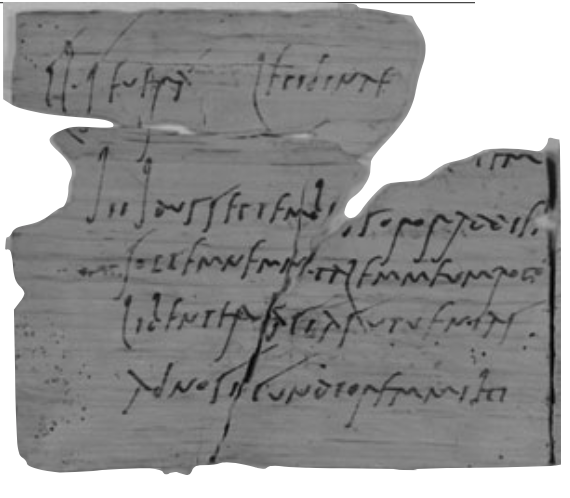57 Vindolanda 291
This is the first of several letters from Claudia Severa,
the wife of Aelius Brocchus, to Sulpicia Lepidina, the wife of Flavius Cerialis. In this letter, Severa invites Lepidina to her birthday party. Severa concludes the letter by expressing greetings to Brocchus from herself and Cerialis. This and the following letters offer an invaluable glimpse of an ancient friendship between two woman in their own words.
Text
[outside] Sulpiciae Lepidīnae Flāviī Ceriālis ā Sevērā
[inside] Cl(audia) Sevēra Lepidīnae suae salūtem. III Īdūs Septembrēs, soror, ad diem sollemnem nātālem meum rogō libenter faciās ut veniās ad nōs, iūcundiōrem mihi diem interventū tuō factūra, sī veniēs. Ceriālem tuum salūtā. Aelius meus et fīliolus salūtant. [in another hand] spērābō tē, soror. valē—soror, anima mea, ita valeam, et kārissima—et have.

Vocabularia, Res Grammaticae, et Alia
Commentariolum
The handwriting in this letter is elegant, and includes the occasional marking of macrons! It is almost certain that Severa herself wrote the the valediction in her own hand and so this is the earliest example of writing in Latin by a woman.
1 Flāviī Ceriālis: the genitive limits Sulpiciae Lepidīnae; Note the position of the preposition ā.
2 III Īdūs Septembrēs: What is the date in our calendar? Remember (1) that September has 30 days so its Ides falls on the 13th day of the month, and (2) that the Romans counted inclusively.
3 sollemnem: the party won’t be dour; this word was often used to describe birthdays; cf. Horace, Odes 4.11, Fronto, Letters to Marcus Aurelius 1.2.
faciās: the ut introducing the indirect question is omitted, as often.
4 factūra: agrees with the subject of faciās and veniās; the future participle here conveys purpose.
5 Aelius meus: Aelius Brocchus (see on Vindolanda 233 above)
6 have = Severa aspirates the valediction, ave. The aspiration of this verb varies over time and space.
kārissima: = cārissima

